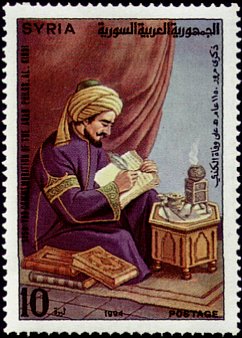 |
MOHAMMEDAN MEDICINE |
 |
|---|

At one time Mohammedan Science and Medicine was far more advanced then that of the West. In fact their state of learning was so far advanced that quite literally, if you were ill and wanted to receive the best health care possible, your best bet was to travel to the Middle East for treatment.
Arabian Medicine 800-AD - 1527:
Whole books and numerous articles have been written on the subject; --- Many of which can be found on the internet. Here by way of introduction and for the sake of brevity, is a very short time line.
- 400 AD: With the fall of Rome, the Dark Ages begin and the West goes to hell in a Han-basked.
- 400 - 650 AD While the West was going down the tubes, the Byzantine Empire in the Eastern or Greek part of old Roman Empire, kept chucking along. Thus, Greek-o-Roman medicine, while not advancing very much, at least was kept alive.
- 630 AD A massive plague (probably Bubonic plague)strikes the Byzantine Empire at about this time, killing a whole lot of people and greatly weakening it. [1a]
- 650 AD Islam is created at about this time.
- 650 - 800 AD Due in large part to the Byzantine disease (a.k.a. massive government corruption, ineptitude etc.), the Mohammedans are almost welcomed as liberators, and soon conquer much of what used to be the Byzantine Empire.
- 850 AD Arabic soon becomes the dominant language in many parts of the Mohammedan Empire. - Arab (a.k.a. Islamic) scholars begin to translate many of the Greco-Roman medical textbooks into Arabic. In addition, they also begin to translate and incorporate the medical sciences of India and the Far East. In time, taking the best knowledge from other cultures and adding improvements of their own, they create what is now acknowledged as being the best understanding of medicine known at the time.
- 980-1037 AD AVICENNA - writes the “Canon of Medicine,” which for its day was probably the advanced scientific medical textbook available. Although written in Arabic, it would one day be translated into European languages and comes into wide use in Western Universities. This work was so advanced that it would continue to be used by Western Universities until well into the 17th Century. The Canon of Medicine, makes various references to cannabis.
- 1100 It was during the 12th Century that many of the major Arabic language medical books begin to be translated into Latin and other Western Languages. Their knowledge at this time was recognized as being superior to anything that West.
- 1250 The fail of Baghdad (burnt actually), many of the great medical books are destroyed.
- 1450 The Gutenberg Press makes mass production of Medical books possible.
- 1527 Paracelsus (the bad boy of Western Medicine), throws a copy of Avicenna’s “Canon of Medicine” into a bonfire, thus bringing to an ignominious END the era of Mohammedan Medicine [1b]. By this time it had now become obvious to most that Western Medicine was superior.
 AVICENNA |
 Maimonides |
 Al-Kindir |
 Ibn-Wahshtya |
 Al Razi |